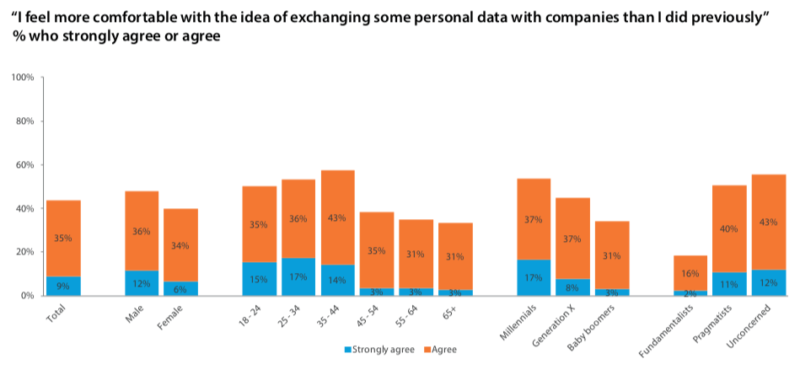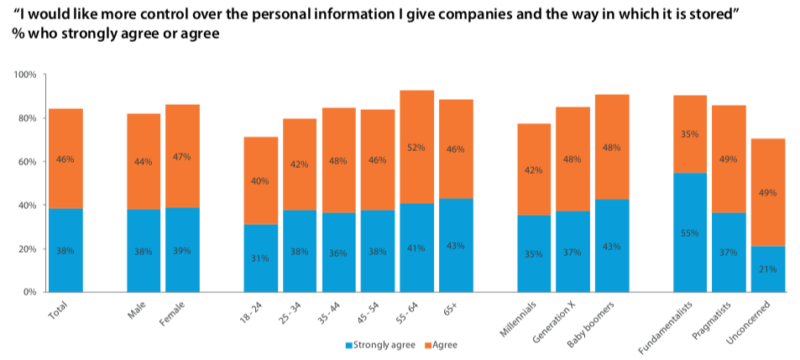Survey: 58% will share personal data under the right circumstances
Those circumstances mostly involve first parties and require trust and a clear value exchange.

Another day, another survey on consumer privacy. And like many of the others, a new survey (.pdf) from Acxiom and trade group DMA seeks to put a positive spin on mixed results.
The big takeaway is that most US consumers are so-called “data pragmatists” who will trade personal information for certain incentives or benefits under the right circumstances. This is more true for millennials than other groups.
The finding is nothing new and is consistent with many dozens of similar surveys that have been conducted over roughly a decade. What’s new here is the context; it comes in the wake of data breaches and scandals (see Cambridge Analytica) and the recent implementation of GDPR.
As mentioned, marketers and ad purveyors can take some comfort in the finding that a majority of Americans are either “unconcerned” (18 percent) or “pragmatists” (58 percent) when it comes to use of their personal data. Only 24 percent are “fundamentalists,” defined as those “unwilling to provide personal information even in return for service enhancement.”
 Pragmatists are defined as a group that “will make trade-offs on a case-by-case basis as to whether the service or enhancement of service offered is worth the information requested.” The most basic example is someone willing to share location for map directions. There’s a clear value exchange. Another example is someone willing to provide an email address to receive a 10-percent-off coupon or to gain early access to sales information on a retail website.
Pragmatists are defined as a group that “will make trade-offs on a case-by-case basis as to whether the service or enhancement of service offered is worth the information requested.” The most basic example is someone willing to share location for map directions. There’s a clear value exchange. Another example is someone willing to provide an email address to receive a 10-percent-off coupon or to gain early access to sales information on a retail website.
The survey also found that respondents were more aware that their data were being collected than in previous years. This is a neutral finding. However, there appeared to be a general openness to “data sharing”:
- 62 percent of American consumers believe that sharing data and personal information online is part of the modern economy.
- Just over two in five consumers in the United States agree that sharing data is essential for the smooth running of society.
- Just over half of consumers indicate that they are happy with the amount of personal data they provide to companies these days.
All these numbers are higher for millennials.

The finding immediately above — about consumers’ comfort level with data sharing — is reflective of the subjective, half-full/half-empty nature of this discussion. Depending on your spin, “less than 50 percent” or “nearly 50 percent” of consumers were more comfortable sharing more data today than they were in the past.
In the “negative” column, a majority also believe that data sharing benefits enterprises (75 percent) more than consumers (11 percent). And 84 percent would also like more control over the information captured and used by enterprises. These last two findings imply consumer dissatisfaction with the current state of the market.

The battle is for the pragmatists, those ambivalent about sharing their data but willing to share it on a case-by-case basis. What are the factors that determine when they’ll share data and when they won’t? As one might expect, trust is the variable more than any other that determines whether consumers will trade their email addresses, location or interests in exchange for perceived value or benefits from enterprises and marketers.

Trust is in relatively short supply in the survey. Among a hierarchy of categories, doctors and banks are relatively well trusted, but other entities are not as much: online retailers are trusted more than social networks, with others falling in between. Transparency, clarity and control are other factors that contribute to trust, according to the survey.

The survey puts a positive spin on mixed findings that actually are not much different from other surveys conducted in the past. The survey’s real value is not convincing everyone that consumers are more willing to share their data today. It’s in pointing to factors that should guide marketers in trying to build trust with their audiences.
The conspicuous missing piece in the report is a question about first-party vs. third-party data sharing. We can assume that nearly all of the above pertains to first-party data sharing.
It goes without saying that only a small minority of consumers would consent to sharing their data with third parties. Yet much of contemporary digital marketing is built on access to and transmission of third-party data, most of which happens behind the scenes and without US consumers’ knowledge or consent.
Opinions expressed in this article are those of the guest author and not necessarily MarTech. Staff authors are listed here.
Related stories
